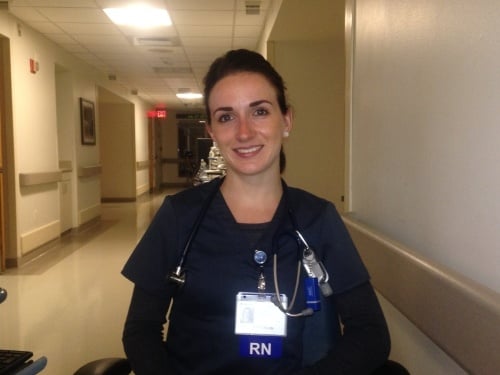From the Corner Office to the ICU
George Geary, RN, MBA left his job as the president and CEO of Milton Hospital to become a nurse. Read on to find out why he went from administration to patient care.

It's never too late to try something new. Ellen Mitchell graduated in May 2014 from Laboure's Medical Coding certificate program and now she's ready to dive into an entirely new career.
You worked as a nurse in major Boston hospitals for decades- why switch to medical coding now?
After working as a nurse for so many years, I didn’t want to abandon the healthcare industry. I wanted to use my knowledge of disease and patient care in a new and different way. I saw an article about medical coding in a magazine and decided to look into it. Moving into coding helped me see the other side of health care, which has been really interesting.
Why did you choose Labouré College’s HIT coding certificate program?
I visited the American Health Information Management Association (AHIMA) and American Academy of Professional Coders (AAPC) websites looking for information and saw Labouré College listed as an approved school. Finding a school that was accredited and recognized by relevant governing bodies was really important to me. I also knew co-workers who had attended Labouré for nursing and spoke highly of their time there. Plus, the location in Milton made it really convenient for me.
How did Labouré College prepare you for your first job in coding?
I’ll be honest, at first, it seemed like there was a lot of homework, but looking back, I can see I was building a really strong foundation in coding the whole time. I felt like everything I learned in class was directly related to what I would need to know out in the workplace.
Elise Belanger, the HIT chair, also really encouraged us to join professional organizations like AHIMA and AAPC and to get involved. I’ve attended the AHIMA conference the past two years at her urging and I regularly attend AHIMA and AAPC networking events.
What kind of jobs can you obtain after you finish the HIT certificate program?
One of the great things about Health Information Technology is the variety of opportunities and job settings available. You can work in a hospital, doctor’s office, insurance company, or billing agency. You can also specialize in a particular area like cardiology or dermatology.
Once you have some experience, you can also find a lot of jobs that you can do from home remotely which would be great for parents or people looking for more flexibility. There are also a lot of part-time and per diem jobs out there for coding.
What is your dream job in Health Information Technology?
After I finish my year of apprenticeship as a coder, I plan to go on to become a Clinical Documentation Improvement Specialist. As a CDIS, I will work closely with doctors and hospitals to ensure the accuracy of all charts and records. It will be a great fit for me, as employers typically like to hire RNs for these kinds of positions due to their extensive knowledge of patient care and disease.
Want to find out more about Medical Coding or Health Information Technology? Contact Admissions at admissions@laboure.edu

George Geary, RN, MBA left his job as the president and CEO of Milton Hospital to become a nurse. Read on to find out why he went from administration to patient care.

Shelly Masters has earned degrees in both Nursing and Radiation Therapy from Laboure College. Find out how she plans to use them both together to serve her patients.

Lina Sheridan is a recent graduate of Laboure College's hybrid RN-BSN program. Find out what it's like to work as a nurse in the OR at Mass General Hospital.
© 2024 Labouré College of Healthcare. All Rights Reserved.
Comments